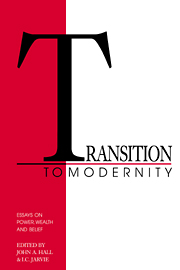Book contents
- Frontmatter
- Contents
- List of illustrations
- List of contributors
- Introduction
- PART I THE PRE-MODERN WORLD
- PART II TRANSITIONS TO THE MODERN WORLD
- PART III MODERNITY AND ITS DISCONTENTS
- 8 Science, politics, enchantment
- 9 Deconstructing post-modernism: Gellner and Crocodile Dundee
- 10 A methodology without presuppositions?
- 11 Gellner's positivism
- 12 Left versus Right in French political ideology
- 13 Property, justice and common good after socialism
- 14 Social contract, democracy and freedom
- 15 Thoughts on liberalisation
- 16 Peace, peace at last?
- Indexes
12 - Left versus Right in French political ideology
Published online by Cambridge University Press: 02 February 2010
- Frontmatter
- Contents
- List of illustrations
- List of contributors
- Introduction
- PART I THE PRE-MODERN WORLD
- PART II TRANSITIONS TO THE MODERN WORLD
- PART III MODERNITY AND ITS DISCONTENTS
- 8 Science, politics, enchantment
- 9 Deconstructing post-modernism: Gellner and Crocodile Dundee
- 10 A methodology without presuppositions?
- 11 Gellner's positivism
- 12 Left versus Right in French political ideology
- 13 Property, justice and common good after socialism
- 14 Social contract, democracy and freedom
- 15 Thoughts on liberalisation
- 16 Peace, peace at last?
- Indexes
Summary
My main theme here is going to be the chronic division of Left versus Right in French political ideology and political life. But before coming to it, allow me to recall one or two definitions and some of the results of a previous comparison between France and Germany. I call ideology a system of ideas and values current in a given social milieu. We shall speak of a certain ideology as being predominant respectively here and there. What is a predominant ideology? It is not exactly the ideology of a majority of the people nor something stable that would be seen to underline historical changes. It is rather something that comes spontaneously to the mind of people living in the cultural milieu considered, something in terms of which those people speak and think, and which is best revealed by comparison with other cultures.
Thus, there is a difference between what it means to be a Frenchman and to be a German. We may state a basic contrast. ‘In his own idea of himself, the Frenchman is a man by nature, and a Frenchman by accident, while the German feels he is first a German and then a man through his being a German’. For the French side, I can quote a statement made by a French historian and adopted without ado by another historian: ‘Nous n'avons pas á rougir qu'un hasard nous ait fait naitre frangais …’ In English that means something like ‘There is no cause for blushing in having been born a Frenchman, for it is a matter of chance’.
- Type
- Chapter
- Information
- Transition to ModernityEssays on Power, Wealth and Belief, pp. 259 - 280Publisher: Cambridge University PressPrint publication year: 1992
- 1
- Cited by

